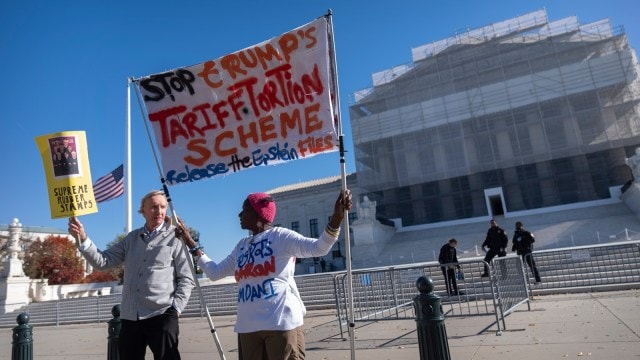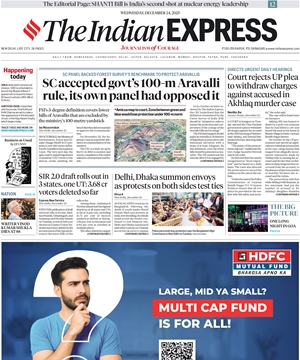US Supreme Court justices appear skeptical of Trump tariffs, raise sharp questions during high stakes hearing
Three conservative justices of the Supreme Court, Chief Justice John Roberts, Justices Amy Coney Barrett and Neil Gorsuch, sounded skeptical of the government’s move.
 Protesters stand outside the Supreme Court in Washington. (AP Photo)
Protesters stand outside the Supreme Court in Washington. (AP Photo) A majority of US Supreme Court justices appeared skeptical on Wednesday during the hearing of President Donald Trump’s ability to unilaterally impose global tariffs on almost all trading partners of America, and sharply questioned the sweeping tariffs which could have wide implications for his agenda and global economy in the biggest legal test for his presidency during the second tenure.
Three conservative justices of the Supreme Court, Chief Justice John Roberts, Justices Amy Coney Barrett and Neil Gorsuch, sounded skeptical of the government’s move and questioned whether an emergency law can give President Trump limitless power to set and change duties on imports, which can have a potential trillion-dollar implications in the financial world, AP reported.
The US Supreme Court is hearing the matter brought in by a number of small businesses and a group of states who have argued that Trump administration’s imposition of sweeping tariffs are illegal as only the Congress has the power to pass and impose taxes.
Other than the conservative justices, the apex court’s three liberal justices also appeared dubious over Trump administration steps to impose sweeping tariffs on almost all of America’s trading partners. It effectively means that if at least two conservative justices vote against the Trump administration, it could virtually limit Trump’s tariff powers under the law.
The US Constitution clearly details that Congress has the power to impose tariffs but the Trump administration, for the first time, argued that an emergency law legally allows President Trump to regulate importation, including imposing tariffs.
Justice Neil Gorsuch, during the hearing said, “It’s a one-way ratchet toward the gradual but continual accretion of power in the executive branch and away from the people’s elected representatives,” later suggesting the “power to reach into the pockets of the American people” must be “done locally, through our elected representatives.”
However, the US Supreme Court which has a 6-3 conservative majority, usually takes weeks and months to finalise big verdicts, though it might move swiftly in Trump’s tariff case.
(with inputs from AP)





